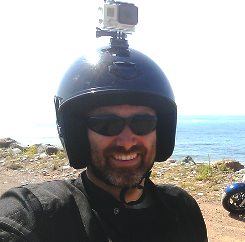The Open Government Tour 2014 is officially in the books. I rode my motorcycle about 18,500kms all in an effort to bring attention to the Open Government and Open Data Movements.
One of my goals was to put into practice the theories of Open Government. In a weird way, I (kinda) wanted to put myself in the shoes of government/public servants and have a better understanding of their perspective in executing a project that truly embraced the Open Government values.
Now that the #OGT14 is over, I’d like to share my thoughts on how government/public servants can help bring about an Open Government culture.
Open Government is Open Source
And open source is about letting strangers in on your plans.
Whether you’re talking about Linux, Firefox, or Creative Commons, open source projects all have one thing in common: Strangers working together towards a common goal. For Open Government, that goal is the creation of an accountable, transparent, and collaborative government.
 My first iteration of the Open Government Tour was called “30 in 90 – The Open Government Tour” and it was conjured almost two years ago now. It was a means for me to spend an entire summer touring Canada on my motorcycle. I was planning it all by myself, made bad decisions, and the stars simply wouldn’t line up. Although I had put together a budget, planned my route, and arranged my schedule, the tour just didn’t seem to gel.
My first iteration of the Open Government Tour was called “30 in 90 – The Open Government Tour” and it was conjured almost two years ago now. It was a means for me to spend an entire summer touring Canada on my motorcycle. I was planning it all by myself, made bad decisions, and the stars simply wouldn’t line up. Although I had put together a budget, planned my route, and arranged my schedule, the tour just didn’t seem to gel.
I was adamant that my values for the Open Government Tour could not be compromised. The tour had to practice what its subject matter preached. The tour could not be a hypocrite of its own image…and that was my biggest fear: That strangers would spoil it and make it worse.
The second rendition of the Open Government Tour only came together when Keith Loo and Bruce Chau of Make Web Not War (strangers) got involved. Eventually they would become the patrons (not sponsors) of the #OGT14.
“This was not a business agreement, this was a relationship.”
You may now be asking yourself “what is the difference between a patron and a sponsor?”
One of my biggest concerns was that I didn’t want to be a corporate shill, or a walking billboard. I didn’t want to be censored (because I’m liable to say some pretty outlandish stuff) and I didn’t want to get involved in creating “ROI Reports” or that kind of bull. All I wanted to do was create and see what happens.
[youtube https://www.youtube.com/watch?v=n_wACnYX4Vs]
I suggested that Make Web Not War become my patron, and that they commission me to create Art in the form of Civic Engagement…and to my surprise, they were right on board!
They had the means to enable me and the tour, and that’s exactly what they did. They trusted me and I trusted them. We were always clear with our intentions and never kept anything from each other. This was not a business agreement, this was a relationship, and of all the things to come out of the #OGT14, this “patron/artist” relationship towards civic engagement is one of my proudest accomplishments.
Here’s an example of what I mean. One of my biggest problems the first I tried to put the tour together was tactics. I just didn’t know how to properly execute the tour. It was Keith and Bruce that suggested the tour should only go where people want it to go and that each event should learn from itself through the help of City Champions. These City Champions (more strangers) also had their own vision on how to make the tour better and their passion should not be hindered.
…if I wanted the #OGT14 to be a success I had to get A LOT more people involved, and this was one of the most difficult things for me. I had to learn to let go. And once I did, that’s when the #OGT14 found its groove and gained momentum.
And that’s what I’ve come to learn. Sometimes the reason why government culture change doesn’t happen is NOT because bureaucrats are too lazy or because politicians are too selfish. It’s because sometimes they care so much they are afraid a stranger is going to spoil it or make it worse.
The #OGT14 is an example on how when you have a collaborative environment with the right values, you can trust people not to spoil things or make them worst.
 Richard Pietro considers himself as an Open Government Fanboy in an attempt to create Civic Engagement as Art. Richard’s Twitter handle is @richardpietro and you can learn more about his work at MyEinsteinJob.blogspot.ca.
Richard Pietro considers himself as an Open Government Fanboy in an attempt to create Civic Engagement as Art. Richard’s Twitter handle is @richardpietro and you can learn more about his work at MyEinsteinJob.blogspot.ca.


